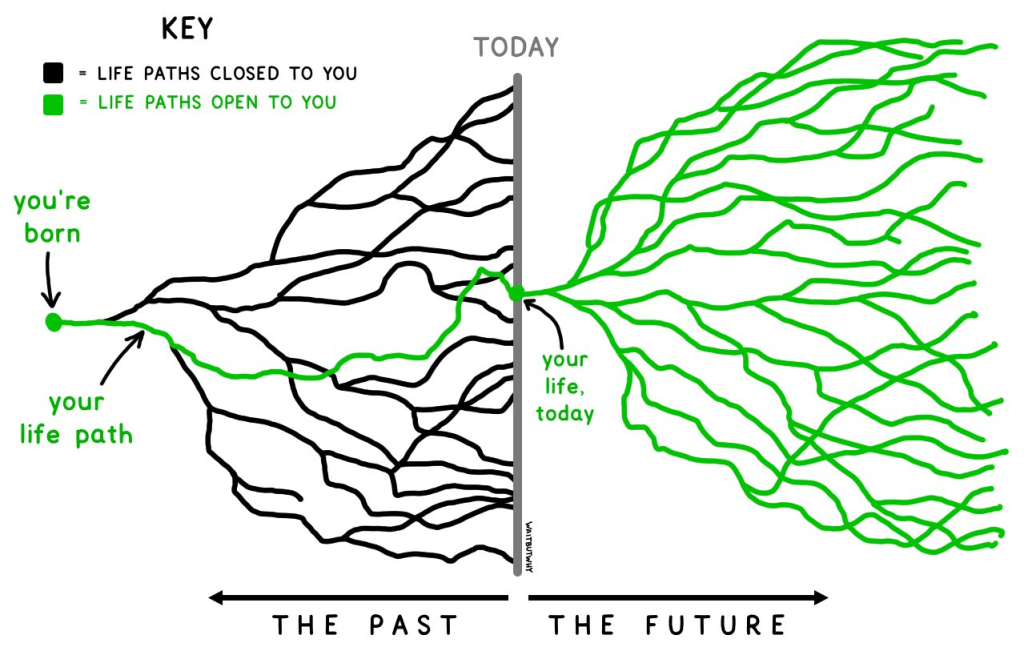Origin
The foundational ideas and concepts first came to Sami’s awareness gradually, over many years. This included themes such as the generally sorry state of public discourse today, the media environment, the loneliness epidemic, ineffectiveness of many political structures, collateral damage from our economic structures, general dismay at the lack of long-term thinking, and the desire to encourage more open thinking.
Then it all came suddenly together, well, together.
The Open Path Society began as a spark of an idea born from the lively discussions of two curious minds, Sami and Jun. They realized that true magic happens when diverse perspectives collide and envisioned a community where people could contribute to a collective journey of discovery and shaping of individuals and societies.
And so the Open Path Society was born – still an experiment, a seedling of an idea, but now ready to grow into an actual small community of freethinkers. We invite you to join us on this exciting adventure, to add your voice to the chorus of curiosity, and to help us create a space where every question is an opportunity for growth. We believe this should all take place predominantly face-to-face;
Together, let’s embark on a journey of the mind and heart, and see where the open path leads us.
Contact us for more information.
Our brains evolved to think with people: to teach them, to argue with them, to exchange stories with them.
Annie Murphy Paul in The Extended Mind
Founding / Inspirational Literature
Many of the ideas and concepts arrived in the form of work others have done; the below lists the main sources of inspiration, with the Freethinking book possibly being the single most important one; Open Path Society is essentially a community of thinking that the book talks advocates for.
- Freethinking: Protecting Freedom of Thought Amidst The New Battle For the Mind by Simon McCarthy-Jones
- Radical Curiosity: Questioning Commonly Held Beliefs To Imagine Flourishing Futures by Seth Goldenburg
- How to Survive the Modern World: Making Sense Of, and Finding Calm In, Unsteady Times by The School of Life
- The Experience Machine: How Our Minds Predict and Shape Reality by Andy Clark
- The Extended Mind: The Power of Thinking Outside the Brain by Annie Murphy Paul
In addition to the above books, there is also a poem You Did Not Come Here by Emma Seppälä from her book Sovereign that served as an additional nudge (reproduced here with permission):

It’s time to ask the uncomfortable questions. The deep, essential questions. The quietly intimate questions. The questions that get at the roots of the matter. The questions that catalyze new knowledge, rather than merely facilitate the transfer of existing knowledge.
Seth Goldenberg in Radical Curiosity
Behind the Name
The name “Open Path Society” encapsulates the essence of our community.
The word “Open” signifies our willingness to embrace diverse perspectives, challenge conventional thinking, and explore ideas that may lie outside the boundaries of mainstream discourse. It also points to the future not being set.
“Path” symbolizes two things. First, the journey of intellectual and personal growth that we embark upon together, as we navigate the complexities of the world and seek to understand the world, ourselves and others more deeply. Second, it represents the fact that societies have infinite paths ahead of them; the future is not set on any one path – it is an open path, and even more than that, it is a path we get to make.
Finally, “Society” emphasizes the collaborative and communal nature of our endeavor. We may be few in numbers, but the best thinking is done together, by joint brains, by a society. We are also a part of the large society, which we hope to nudge ever so slightly to something more nuanced, resilient, open, thriving, and loving.
The concept of the open path is well illustrated by this drawing from Tim Urban of WaitButWhy; the context for him was our individual lives, but it applies just as well to societies on a larger scale:

If I had an hour to solve a problem, I’d spend 55 minutes thinking about the problem and 5 minutes thinking about solutions.
Albert Einstein
Activities – what will we do?
We eschew the notion of having a prescribed set of things to “accomplish”, and there certainly will not be KPIs or OKRs, nor do we care about ROI. We believe there is tremendous value in just the meeting of minds and growing awareness, leading to catalyzing change and the society making better decisions.
This awareness needs to start from more discussion, and more meetings of minds.
Things are still in early stages, but we are forming a cadence little by little. For now, we dedicate an evening every two months to Open Path Society. These regular gatherings take place in a quiet environment conducive to discussion (and often also include food), and are intended to bring together diverse minds to explore themes that matter. We will mostly focus on discussion, but may invite openings or very brief presentations as starters for framing.
As we find our sea legs, we will think about organizing other activities such as reading groups, workshops, and more.